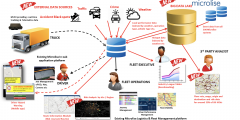Using Julia on the HPC
September 30, 2022
In this blog, we explore the speed and efficiency of using the programming language Julia on the University’s high-performance computer. This blog has been guest-authored by Jamie Mair, a PhD researcher in the School of Physics and Astronomy. The repository for the code given below, which was presented at this year’s annual UoN HPC conference, …
Automated anonymisation of texts and transcripts
November 22, 2021
In this blog, we discuss an automated process for anonymising interview transcripts, patient notes, or other free-text data containing personal information. Colleagues wishing to share participant notes or interview transcripts, for example as publication appendices or in a research data repository, will likely need to anonymise the data. Anonymisation also comes with a number of …
Creating UoN Research Link
November 9, 2021
In this blog, we talk about how we created UoN Research Link and some of the technical and design decisions taken. What is UoN Research Link? UoN Research Link is a pilot tool with support until November 2025. It lets you search for University of Nottingham colleagues according to research interests and expertise. It can …
Robinhood and the revenge of the reviewer
February 1, 2021
Last week saw the share price of the US retailer GameStop rise from US$65 to US$325. This extraordinary jump was fuelled by private investors who have rallied behind the shorted stock, thus pitching themselves against corporate hedge funds. The narrative of the ‘little man’ battling Wall Street financiers chimed nicely with the name of the …
Driving simulators: four years as an automotive Human Factors researcher
February 12, 2020
My name is Dr Sanna Pampel, new Digital Research Specialist (as of January 2020) and the main contact point in that role for the Faculty of Engineering and the Faculty of Arts. My face may be familiar to Engineering colleagues as I was, from November 2015 to December 2019, a Research Fellow for Automotive Human Factors. In that role, I tested user interfaces for cars, including digital …
Generating Insights from Big Data
September 6, 2019
The analysis of ‘Big Data’ is one of the main challenges faced today by both academia and industry. The project titled Value Enhancement for Data from Assets & Transactions (VEDAT), which was carried out in partnership with the ASAP group in the School of Computer Science aimed to “provide tools that enable intelligent, predictive modelling …
HGV Incident Hotspot Analysis
Hot spot identification (HSID) problems are present across several domains, such as health care, security, maintenance, energy or transport. A hot spot can be defined as an area with high likelihood of occurrence for a certain event. In public health care, algorithms to determine hot spots could be employed for early detection of locations of …
Police interactions and interventions with suspects flagged as experiencing mental health problems
Interactions between individuals experiencing mental health (MH) problems and the police are complex, and effectiveness of innovative support and diversion models in England and Wales not yet fully evaluated. Researchers in the University of Nottingham examined police interactions with suspects and measured the immediate effectiveness of police/NHS MH interventions. Data on police interactions with suspects …
Helping to find the UK’s best HGV driver
The hotspot analysis and HGV driver profiling work also contributed to Microlise’s Driver of the Year competition which recognises the UK’s most talented HGV drivers. Data analysis undertaken by members of the Digital Research Service generates an initial shortlist of fifteen drivers in each of the three categories – short, medium and long-distance drivers. The …
Development of a computational platform to support the use of Genome Wide Association Studies
May 23, 2017
Post by Dr. Philip Quinlan, Advanced Data Analysis Centre (ADAC) The Advanced Data Analysis Centre (ADAC) provides world-leading data analysis expertise, and can assist in developing analytical processes and pipelines. We are currently working in conjunction with the ‘Crops for the Future’ Research Centre at the University of Nottingham’s Malaysia Campus to develop a computational platform to …











